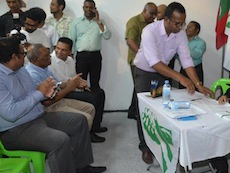The Elections Commission (EC) has not followed through on recommendations of the Auditor General’s Office by taking corrective measures concerning 13 cases flagged in the commission’s audit reports for 2010 and 2011, according to the EC’s audit report for 2012.
The 2012 audit report (Dhivehi) made public on Thursday (June 27) listed 10 cases from 2011 and three cases from 2010 where the Auditor General’s recommendations to hold the responsible officials accountable for illegal expenses were not implemented.
Among the cases highlighted in the 2011 report were expenditure on overseas trips exceeding approved funds after commission members extended their stays, MVR 334,700 (US$21,705) paid to a company contracted to provide sea transportation during the 2011 local council elections for trips not included in the agreement and awarding a contract worth MVR 4.9 million (US$317,769) to a local company to print ballot papers without going through the tender evaluation board.
The 2011 audit revealed that the cost of the extending the duration of official overseas trips between January 2010 and April 2012 amounted to MVR50,438 (US$3,270) for food, incidentals and pocket money.
Other cases from 2011 included MVR 183,238 (US11,883) spent to hire temporary staff and vehicles during the council elections without formal agreements, not seeking quotations or estimates from three parties as required by regulations for procurements amounting to MVR 251,148 (US$16,287), failure to collect or file court cases to recover MVR 469,500 (US$30,447) owed as fines and deposits and MVR 12,999 (US$843) paid to staff in excess of their salaries and allowances.
The cases from 2010 meanwhile included MVR 248,790 (US$16,134) spent to buy 30 mobile phones for senior staff, 13 mobile phones given to select staff as personal property and a senior staff not returning a mobile phone worth MVR 14,195 (US$920) bought in 2008 when he or she left the commission
“In addition to the 13 mobile phones that were given to employees according to documentation at the commission, the records showed that five mobile phones worth MVR 49,135 (US$3,186) were lost,” the 2011 report stated, adding that no employees were held responsible and “compensation in any form was not sought” for the losses.
The 2012 report noted that of the 15 mobile phones given to staff, five have been returned to the commission while the price of one phone was reimbursed by the staff member.
While letters were sent in October 2012 asking staff to return the other nine phones, the audit report noted that the letters had not been replied to as of the report’s publication.
Moreover, of five phones believed to have been lost, the audit report noted that the EC was informed by staff that two were lost while the remaining three were unaccounted for.
Lastly, on a recommendation to identify how nine laptops were lost and to hold responsible staff accountable, the audit report noted that the EC sent letters to two employees in November 2012 without reply, after which no action was taken.
“On June 10, 2012, one employee to whom a laptop was given returned it to the commission’s stock. No action has been taken to seek compensation for the remaining six laptops,” the report stated.
The 2011 audit report had also revealed that the EC made a number of unnecessary purchases, such as a coffee maker for MVR 67,000 (US$4,345) in 2007, a Nikon D200 camera for MVR 233,298 (US$15,129) in 2008, six TV decoders, 16 TVs, 16 shredders, two washing machines, irons, a deep freezer, a mixer, a blender and a gas cooker.
Of 60 fax machines bought by the commission, 50 were kept unused in storage.
Meanwhile, among the cases flagged from the 2012 audit, the report noted that as of March 2013 the commission had not sought MVR 20,000 (US$1,297) owed by political parties in 2012 as fines for non-submission of annual financial statements.
The report noted that the commission has not taken any action concerning the non-payment of fines in addition to sending letters to the parties on August 5, 2012.
In a second case, the audit found that a director at the commission was given notice of termination of employment starting May 2, 2012. However, as the termination chit stated May 6 instead, “we note that the employee was paid MVR 2,468 as salary and allowances for four days for which the office did not receive the employee’s services.”




